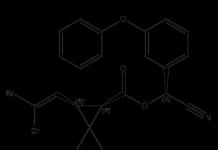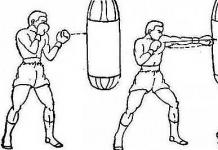I am increasingly coming to the realization that people spend a lot of energy, time and effort on transforming the past, on changing cause-and-effect relationships, ancestral programs, endless interweavings of past incarnations, ancestral programs from past incarnations, and there is simply no end to it, no edge.
If we are people, each person individually is the embodiment of this entire information collapse, then I understand very well those who say that there is simply no and cannot be an end to this work of transforming the consequences of karma - this is the space of options into which you dive, to change your present by “one crumb” and console yourself with the fact that life is getting better day by day. I personally have the feeling that we are fooling ourselves by still rushing into a bright tomorrow.
The past simply does not exist. You can choose an option for your path, figuratively speaking, “from start to finish” in a new way, taking into account what you don’t like today, you always know what you don’t want, and therefore you can choose the highest and best for yourself right now.
The last moment remains - to accept what you ordered, or rather, what you chose from all the available options in abundance available to you from the Creator.
The Creator has the highest and best version of you - after all, this is the energy that abundantly creates this world and constantly develops it; the perfection of nature speaks volumes.
This means that I am the starting point for attracting one of the Creator’s options into the material world. Is my conscious part ready to attract the highest and best option?
Firstly, it will always correspond to my level of consciousness, it will be my idea of the highest and best. This is easier to accept.
Secondly, there is a highest and best version of life from the Creator or from the level of consciousness of the Creator, which, for example, is not visible to me... yet. It's hard to accept what you can't see. There are many reactions that give a lot of information about what is preventing you from accepting this option.
This is real food for thought and work to change your beliefs. By asking one single question - what prevents me from accepting what already exists for me in the highest and best version. This speeds up the work of manifestation innumerable times. You can receive it right there if you are open to receive it.
We are constantly creating this world through a simple search of options, carried out at incredible speed.
It's like an experiment - you're standing in a room whose walls are covered with photo wallpaper, standing in the center of the room, you start spinning in place at great speed for a few seconds. During this time, people enter the room and hang pictures on the walls, but you don’t see them, because everything merges into a blurry flow around you, and when you stop, you see the pictures on the walls and don’t understand how they got there?
The question remains: why can’t we accept the Creator’s option - the ideal form of embodiment of what we want and what experience the Creator expects from us, if all the options already exist. Maybe experience how we will move towards receiving an option from the Creator.
Many argue that the most important thing is to learn to live with God in your soul (no matter how harmoniously you live, you will always make a choice).
In my opinion, this sounds different: making your perfect choice and following through to make it a reality.
And the past is past choices, they stop living in your mind immediately as soon as you make a new choice, it’s as easy as hanging a picture on the wall, even though there was always a nail in the wall for this.
As long as you think that your life today was created by your karma, the tough path of soul-searching, self-flagellation and repentance is guaranteed to you. Forget your old story and start creating what you want. Find what’s stopping you from getting what you want and move on. This is a much more pleasant and joyful path.
But if you prefer to celebrate the past, I don't mind. Everyone has their own task.
First, let's understand the terms. In Sanskrit, the word “karma” means “action”, that is, it is a cause-and-effect relationship.
In the Slavic tradition, karma is described by the saying “what goes around comes around” or “treat people the way you want to be treated.” Any action entails some kind of consequence, or in other words: action gives rise to reaction - this truth is known to us from physics textbooks. Action can be at three levels: body, speech and mind (thoughts). We can say that the law of conservation of energy works here, since any action is determined by the energy expended, which then tends to equilibrium.
Actions at the level of body, speech and mind entail consequences - this is karma.
Most people understand karma as something that they inherited from previous incarnations or something that was passed down by their ancestors. It is believed that karma is static and cannot be changed in any way. This is not entirely true.
For example, in astrology, under karma or fate, you can see your natal chart. It can be calculated immediately at the moment of a person’s birth. An astrological natal chart is our destiny or karma from previous incarnations. But! As you already understand, karma is an action, and with your daily actions you either worsen or improve this karma. Karma is not only something bad, it is also good, depending on what actions you take (if viewed from the perspective of duality). For the universe there are no bad or good actions, there is simply an action and its consequence. Like attracts like.
You were born at a certain time, in a certain place, you have exactly these parents, this particular brother or sister, uncle and aunt, you have exactly this face, exactly this body structure, health at birth, etc. Here we can talk about some kind of predestination. There are things that we cannot change. There is a starting point that can be called karma. There is even a concept of circles of karma, where the first circle is our parents, brothers and sisters. The second circle is our “other halves”, partners and children. It is with them that we will have to learn to build relationships and they are our best teachers.
Only a madman can say that I am completely 100% free and build my life at my own discretion, since there is obvious predestination. The fact that you were born as a human is already predestination. Or the fact that they became enlightened - too.
Any good astrologer can use your natal chart to determine the main periods and events in your life, and also tell you what you will mainly do in different periods of your life. Whether you believe in astrology or not, it doesn't stop working. Here, of course, it is necessary to take into account the human factor; any specialist can make a mistake. Therefore, I do not recommend taking any prediction for granted. And, as they say, water does not flow under a lying stone.
I myself was skeptical about astrology, until one day a good astrologer sorted out my chart. He accurately described past life events to me. This really surprised me. Afterwards, I myself began to study numerology, astrology and palmistry. I studied these sciences more for myself, in order to better understand how the world works. And this is what I came to.
There is, of course, predestination. This is your place of birth, your relatives, your body, your character, which are given to you from birth, and so on. There are things that we really cannot change, but the percentage of predestination for each person is different depending on the initial karma. Let's just say that there are points through which a person must pass, but how he will pass them, what paths he will take to get there is everyone's choice. These points are the initial choice of the soul, overcoming which it develops and improves to the maximum.
If a person’s karma is very heavy, then there will also be a very strong predetermination or even fatality on the face. The more a person develops the energy of goodness, the easier the difficult moments of life pass for him, and sometimes even simply unnoticed.
A not very experienced astrologer may scare you that you will have some difficult periods. But if you are constantly improving, developing high-vibration qualities in yourself, then these difficult periods can pass as easily as possible for you and, perhaps, even with a plus sign.
Such sciences as astrology, numerology, palmistry and others also have a trap for the mind. Many people believe that everything that is given to them according to their natal chart or along the lines on their hands cannot be changed! And this is the most important misconception. It is possible and necessary! And an experienced specialist will definitely tell you about this, that even the lines on your hands change depending on your actions. As I said earlier, your karma changes from the moment you are born and you have the power to change it for the better.
I highlight two views on fate, karma and predestination.
- The percentage of predestination is different for everyone, depending on your actions in the current and past lives. Sometimes the soul comes here to simply work off very difficult karma, for example, an early death or a very difficult life, which maximizes the power of divine love. The more a person develops high-vibration qualities, the faster he is able to leave the circle of reincarnation. This is called enlightenment.
- Predestination exists 100%. And if it seems to you that you are changing something, then it only seems to you. The soul wants to play all the games and explore life from all sides. To do this, she needs to play different roles and get enough of samsara to the fullest. After which she can safely leave this mortal world and never reincarnate.
Personally, I like the first option.
Everything that I have described refers to the position of duality and trinity of perception of the world: there is me and the external world, which somehow affects me, there is bad and good, good and evil, and so on. As consciousness expands, a person moves from the ternary system to the septenary system, where he does not exist separately from the world, but within the world and is part of it.
Develop high vibrational qualities in yourself: unconditional love, kindness, compassion, generosity, understanding, justice. Develop your body, eat living food whenever possible, engage in energy practices, develop your consciousness through meditation and you will become the creator of your destiny.
I will be happy to read your views in the comments, write.
Travel and improve yourself, friends!
Alexander Kazantsev
An article about the general concept of the theory of the law of karma, which will tell where the concept of karma itself came from, and how it is interpreted in various spiritual schools and religious teachings.
Law of karma. 12 laws of karma
First, let's look at where the concept of “” itself came from. Some people think that the origin of this law is associated with Vedism, others attribute it to Buddhism, and others generally to new trends that have emerged in modern spiritual practices. Both are partly right, but in order to find out where the law of karma actually came from, we must go back centuries.
The word “karma” itself originates from the word kamma, which translated from the Pali language means “cause-effect”, “retribution”, “action”.
The concept of karma cannot be considered separately from such cornerstone concepts as reincarnation and samsara. We will talk about all this now. The word “karma” appears for the first time in the Upanishads. This, as we know, is one of the texts related to Vedanta, or the teachings of the Vedas. Therefore, if we speak correctly, then all subsequent applications of the concept of karma in other teachings and religions come directly from Vedanta. Buddhism also borrowed it from there, since Buddha himself was born in India, where the rules of the ancient teachings of the Vedas and Vedanta prevailed.
What is the law of karma? This is the universal law of cause and effect, according to which all our actions - righteous and sinful - will have consequences. Moreover, these consequences can manifest themselves not only in the current incarnation, if we take on faith the concept of the reincarnation of an entity and the transmigration of souls, but also in subsequent ones. However, according to the author of the article, this approach is too linear and is applicable only if we consider time as linear, moving strictly forward. There are other concepts of the movement of time, when all three of its components, conventionally called “past”, “present” and “future”, develop simultaneously. But this is a topic for another conversation; however, it is desirable that the reader understands that not everything is as simple as we would like.
Thus, it turns out that our future will directly depend on our actions and thoughts, committed now or committed in the past. This conclusion is interesting because, unlike the ideas of Christianity or Islam, Vedantism much more emphasizes the individual responsibility of a person for what he does. At the same time, he is given a large degree of freedom of choice: he has the right to choose his destiny, since his future will depend on the purity of his thoughts and actions. On the other hand, the past karma accumulated by a person during his previous incarnations influences how he lives now, especially such a factor as the conditions in which a person was born.
What is reincarnation and the law of karma
As we have already said, without the concept of reincarnation it would be almost impossible to explain the law of karma itself. the idea of the rebirth of an entity. The essence can be called a soul or spirit, but the essence is that the soul is constantly reborn in different bodies and not always human.
The idea of reincarnation did not come to us from India, or rather, not only from there. BC, in ancient times, the Hellenes gave this concept another name - metempsychosis. But the essence of reincarnation and metempsychosis is the same. It is known that Socrates, Plato and the Neoplatonists shared the ideas of metempsychosis, as can be seen from Plato's Dialogues.
Thus, knowing that reincarnation is an integral part of our lives, we understand that law of karma working at full capacity. The way you (your essence) behaved in past incarnations will certainly affect what happens in the present, and, perhaps, in other rebirths. Also, during this life, a person has the opportunity to improve his karma through good actions and thoughts so that already in the current incarnation he can turn the direction of his life in a favorable direction.
Why don't Christians have the concept of reincarnation?
In the ancient directions of Christianity, such as the Cathar or Albigensian sects, there was a belief in reincarnation, but in traditional Christianity this idea is completely absent, since it is believed that the soul came here once and after the physical death of the body it will appear before God, where it will be it is decided what will happen next, in life after death - heaven or hell. Thus, a person has no other attempts, which to some extent deprives and reduces the number of opportunities for doing good deeds. On the other hand, he is freed from being in samsara, to which living beings are doomed according to the concepts of Vedanta and Buddhism.
It is important to note the following aspect of the concept of karma: it is not punishment or retribution, although it may be translated that way. Karma is the consequences that a person receives based on how he lived. There is no influence of providence here, so a person decides what will be best for him, and he himself can decide how to behave in order to maximize his influence on fate in this and subsequent incarnations.
12 laws of karma that will change your life. The law of karma in brief
- The first law is great. The law of cause and effect. What goes around comes around.
- The second law is the law of creation. Life arose a long time ago, but it requires our participation. We are part of it. From this we can conclude that the accumulated karma of members of society also affects the development of the entire society.
- The third is the law of humility. Acceptance of the situation. This is one of the most popular laws, which is currently simply exploited with or without reason by various spiritual teachers. Its essence is that only by accepting a situation can a person change it. In general, there is even more to be said here than about acceptance itself: rather, it is about awareness. Once you become aware of the situation or state you are in, you will be able to influence it.
- The fourth is the law of growth. A person must change something first of all in himself. By changing himself from the inside, he changes his life outside, thus influencing the environment.
- Fifth is the law of responsibility. What happens to a person in his life depends on his actions in past and present lives.
- The sixth law is about communication. Everything we do in the present or past has an impact on the environment and the future. Here it would be appropriate to recall the butterfly effect. Every seemingly insignificant action or thought has an impact on us and others.
- The seventh is the law of focus. You can't think about two things at the same time.
- The eighth is the law of thanksgiving. Here we are not talking about gratitude to someone specific, or even about gratitude to a deity, but to the world in general. What you have learned you will have to apply one day. This will be your gratitude towards the Universe.
- The ninth law is here and now. Again, one of the most popular laws borrowed from many spiritual schools. Concentration of thought on the present moment, because, being in the present, but thinking about the past or future, we miss the present moment, depriving it of its originality. He flies in front of us, but we don't notice him.
- The tenth is the law of change. The situation will not change and will be repeated in different forms until you learn the necessary lesson from it.
- The eleventh is the law of patience and reward. In order to get what you want, you need to apply diligence, and then the desired reward will become available. But the greatest reward is the joy that a person receives from doing the right thing.
- The twelfth is the law of meaning and inspiration. What you put a lot of energy into plays a big role in your life, and vice versa.
There are also the so-called 9 laws of karma, but they mostly duplicate the existing 12 and relate to the further deepening of the theory of the law of karma. Briefly, the law of karma can be reduced to the following: everything that happens to a person in life is the result of his actions in the past or present and is aimed at restoring the balance between what has been done and what is being done in the present and future.
The law of retribution is karma: the law of karma states that a person is responsible for what happens to him
As we noted above, the law of karma is not the law of retribution. More precisely, it should not be understood as retribution from the outside, by the invisible hand of God or something else. This law can be understood from the position of retribution only in such a way that a person shapes his reality through his actions, therefore retribution will occur depending on how many good or wrong actions and thoughts were generated during past lives. This is where concepts such as “heavy” or “light” karma originate. If a person has “heavy” karma, then it may have to be overcome over several incarnations and it will continue to influence the person in the form of life circumstances, his environment, etc.
It is interesting to look at the interpretation of the concept of the law of karma in the philosophical schools of Samkhya and Mimamsa. These are ancient philosophies that arose from the teachings of the Vedas. Here the law of karma is understood exclusively as autonomous. It is not connected in any way with influence from above, i.e. responsibility for what is happening lies entirely with the person. In other schools that recognize the presence of God or a supreme being who controls our lives, the law of karma is explained differently. A person is not responsible for everything that happens to him, because there are invisible forces on which the course of life in the Universe also depends, but the law of karma is in effect.
The Buddha's path and the laws of karma
One of the most significant interpretations of the law of karma for us came to us from the teachings of Buddhism. Buddha, as we know, recognized the operation of the law of karma, but his reading of this law was not rigid. In Buddhism, the presence of karma does not mean that a person will live his life only as it was destined for him in connection with the karma he has accumulated from previous incarnations. Thus, Buddha says that man has control over fate, he has free will.
According to Buddha, karma is divided into 2 parts: that accumulated in the past - purana-kamma - and that which is being formed at the present moment - nava-kamma. Past karma determines the circumstances of our lives now, and what we do at the present moment - nava kamma - will shape our future. In another way, this is also called “daiva”, or fate, determinism, and the second part is purusha-kara, or human action, i.e. human initiative, will. Thanks to this second part of karma - nava-kamma or purusha-kara - a person is able to change his future and even his present.
The most important moment of purusha-kara (human action) can be considered its highest manifestation - action without the desire to get a result. This is one of the foundations of the Buddha's teaching - to eliminate desire, because desire is the basis of suffering. The doctrine of suffering is a kind of axiom of the teachings of Buddhism, known as the “4 Noble Truths”.
Only after liberation from desire, any actions performed will cease to be tied to the result, because it is the desire for the result, whatever it is - good or bad, whether it was formed by a good or bad intention - that continues to work to create karma. Not surprisingly, the Buddha also says that only actions produced as a result of intention, and not just any actions, lead to the creation of karma. So we again see a bias towards the sphere of awareness.
Those who strive to move to nirvana need to gradually get rid of desires. Then you will achieve moksha and the law of karma will cease to work. From the above it is clear that the law of karma will work where there is attachment to the result, and it is generated by the power of desire. You need to lower your desire to get something, and then you will get it. This is one of the conclusions that can be drawn by studying the law of karma and its interpretation by the Buddha. It's easy to understand in theory, but can be quite difficult to apply in practice. In order to become a Buddha, you do not need to strive to become one. This is the essence of the teachings of Buddhism stated in one sentence.
Trying to find the reasons for the events that happen in life, many of us (if not all...) in one way or another come to interact with the concept of karma. The author was no exception. This topic has been recurring in my mind for many years. The temptation to discover some universal mechanism that would finally put everything in one’s life on its feet did not go away for many years - until the time when this desire began to gradually dissolve, losing its influence inducing further research. It cannot be said that this happened because the author did not care. Rather, there was no need for further search. Because a vision of the overall picture gradually emerged, in which karma lost its traditional determining role. So to speak, the ardent desire has gone, a deep understanding has come - another illustration of the power of acceptance, which naturally arises in an individual moving along the Path under competent supervision (J).
So! Karma... Is a central concept in Indian religious cults and philosophy, introduced into use more than 2.5 thousand years ago. It personifies the universal law of cause-and-effect relationships in a person’s life (and even more broadly, any relatively living creature that a person can be in his previous lives) between the events and actions of the past, on the one hand, and the present and future, on the other. The concept of karma is inseparably linked with another basic concept of Hinduism - samsara (the wheel of samsara) - a continuous chain of cause-and-effect relationships covering a series of human incarnations, including in pre-human forms (mineral - plant - microbe - insect - animal - human... ). Involvement in the wheel of samsara is determined solely by the degree of ignorance (avidya) of the living being who is involved in the rotation of the wheel. Until you understand what and how is happening to you, you are doomed to remain a “squirrel in a wheel” of a bizarre interweaving of problems and joys generated exclusively by the cause-and-effect relationships of your individual karma.
In general - beautiful!!! And, it would seem, this interpretation explained everything. However, the years passed, and life did not become simpler or easier, and even, in some places, on the contrary. Avidya... It sounded good, but it meant only one thing - you don’t understand anything in life in general and in your life in particular. And so you continue to spin in a wheel that is specific to you personally. In addition, it should be noted that the described picture in the case of the author, who has many years of classical yoga practice, was significantly worsened. After all, practice should have once removed the veil of ignorance. But I didn’t take any pictures. Maybe not in this life?! Ehhhh...
And it was at that moment that the Master appeared. Ignorance/avidya and the resistance that accompanies it began to smoothly, year after year, completely imperceptibly in the moment, transform into understanding and acceptance. This process also touched on the topic of karma (reincarnation, reincarnation of souls, etc.). The author's understanding of the topic does not entirely coincide with traditional approaches. However, the characteristic features of the very process of the emergence of understanding allow us to hope that its manifested details, described below, are not a simple fantasy on the topic of this article. However, as will be clear from the further presentation, the hope was not fully justified (J) ...
First of all, you should contact processes of disembodiment and embodiment of a person on the manifested earthly planes. The reverse order of these processes in this presentation seems more convenient for perception, since during the act of disembodiment the most important phenomenon occurs that directly affects the existence of karma - “the merging of a drop with the ocean.” This act is extremely difficult to compatible with the existence of a chain of cause-and-effect karmic connections, seemingly penetrating and connecting together an infinitely large number of human incarnations. Either the karmic chain breaks (hence, karma does not exist) upon disincarnation and dissolution in the Creator, or, if karma is preserved, full dissolution should not occur! At the same time, there is the fact that the concept of fusion is unusually widely used in the Sufi tradition and its objectivity cannot be doubted. Obviously, in such a situation, karma can only “fall victim” to the process of resolving duality - karma vs fusion! Thus, karma degenerates into a set of cause-and-effect relationships that exist within only one (!!!) life. It can also be said that the concept of karma exists only in the form of an idea that has a very distant relation to the reality of existence.
At the time of disincarnation, the main significant results of a person’s life are:
- a set of consequences of his actions remaining after leaving;
- a set of impressions acquired in the course of life.
The consequences of man's actions, both already formed and not yet manifested, extended over time, were produced on the basis of his free will and under the parallel influence of four factors, set out below in descending order of their importance and influence:
- customized Pattern, which is an integral and integral part of the general Pattern located on the mental plane of existence; it determines all possible options for future events in a person’s life;
- essential characteristics of a person, formed as a result of a combination of two influences: characteristics provided from Above during the process of incarnation (but how does this happen?..), necessary to obtain maximum experience from living life events in accordance with the individual Pattern, on the one hand, and on the other, genetic characteristics and behavioral predispositions inherited from previous generations;
- programming actions of surrounding people, the value of which is higher the earlier they were produced; it is these actions that form a set of those conventions and ideas that, like viruses (imperceptibly, but inevitably) influence the life of the average person throughout his entire subsequent life;
- actions performed by the person himself earlier in the present life, influencing the current moment of its existence and its future along a chain of cause-and-effect relationships; the influence of this factor is a complex combination of the consequences of previously occurring actions and events, the strength of which does not directly depend on the distance of these events in time from the current moment.
Only the fourth factor is subject to the direct influence of the will of an individual. Elimination of the consequences of the third factor, invisible in everyday life, becomes possible only after serious internal work of the individual and with certain help from Above. The second and first factors are determined by the Will of the Creator, however, the focused efforts of the seeker in practices that cleanse his inner space and ensure spiritual growth can change a lot, opening up additional options for choice that were not there before...
A person’s lifetime activity under the influence of four factors gives rise to consequences that change in a certain way and to some extent both the manifested plans (primarily) and the Divine (to a degree depending on the individual person, but, as a rule, tending to “0”) .
As for impressions from the life lived, they are recorded in the form of figurative memory contents in the conscious and unconscious parts of the body of the human mind (recording absolutely all events of the life lived).
With the death of a person, his individual Consciousness, which throughout his life maintained the assembly of three bodies of the manifested plane (physical, etheric, mind body), leaves the earthly planes. The physical body disintegrates. The same process, albeit a little more extended in time, occurs with two other terrestrial bodies and their intravital contents. What is usually called the "soul" and is obviously the sum of the contents of these two bodies, also disintegrates. At the same time, it disintegrates irrevocably! What remains is only a complex of life impressions recorded in memory, which, with the death of a person, first completely moves into the unconscious part of the body of the mind, where for a short time it is pre-structured in order to, simultaneously with the disintegration of the body of the mind of the deceased, take its rightful place in the collective unconscious (aka - Akashic Chronicles) - the “deepest” level of the plane of mind.
Individual Consciousness remains in tune with the complex of impressions from the life lived, even after the moment when they were “packed” into the structure of the collective unconscious. At the moment when a “drop” of individual Consciousness, detached from its attachment to the earthly planes, merges with the “ocean” of the Divine Consciousness, this attunement becomes available to an infinite number of “former drops”. And also those who are yet to become “future drops” sent for embodiment on earthly planes. Each of them, going “down” into lifelong captivity of the materiality of the manifested plane, is in tune with absolutely all sets of impressions from lives (and not only human ones) that have ever taken place on earth before. But some of these contents turn out to be “closer” to the incarnating individual Consciousness than all others. This inclination is determined solely by the plan for the future life contained in the individual Pattern. Of course, you can call it memory of past lives. Moreover, this “memory” can be raised under certain conditions (the author has experience of hypnotic regression into “his past lives”, however, even after many years after this experience he cannot clearly judge whether it was real content or fantasy). But it is apparently not worth asserting, being in the place of a specific person, that these fragmentary memories are the experience of his past lives.
There is, however, one exception to the described scheme, which should be mentioned separately. This exception is people who were reunited with the Creator (with the ocean) before their physical death. Their scheme is different. But it is still beyond perception.
What is left of karma? Just a memory of a beautiful idea... And an understanding of the simple fact that a person is completely responsible for his destiny, since it is he who, taking certain actions in his own life today, will inevitably face their consequences in the future. After all, he cannot change the individual Pattern at will and exchange his essential characteristics for others, more profitable or convenient. He can only change himself! Including in such a way as to become worthy of a different fate and other essential qualities that were previously inaccessible to him.
The overall picture has emerged - we can finish.
And then someone who is significantly more knowledgeable about the topic of the article asks an “uncomfortable question.” And who, in fact, said that the act of merging occurs after every death? One right blow and the wall of meanings collapsed in an instant (J)…
And it gathered itself into a different, now real and consistent configuration. Really!!! Maybe the merger “threatens” only those who deserve it and were described in the article as an exception - mystics and saints?!! And then it turns out that the individual Consciousness of an ordinary person remains on the plane of consciousness until the next incarnation, maintaining connections with the complex of impressions from a completed life. And it is these impressions (as well as impressions preserved from previous incarnations) that are those essential characteristics that are given from Above at birth and influence the entire future life. They, obviously, determine the harmoniously corresponding structure of the individual Pattern during a new incarnation.
All this is very similar to the existence of what the wise Hindus once called karma. However, the descriptions in the previous paragraph do not coincide in many details with the traditional understanding of it. Perhaps because 2.5 thousand years ago, in principle, there was no conceptual apparatus capable of describing such ambiguous and global things. And perhaps also because phenomena of such a scale, which are an integral part of His Truth, can never be known completely and irrevocably. Because they require endless research by new and new seekers, in which lies the main meaning of Human existence.
For some, karma is retribution for their sins, a kind of cosmic force that rewards everyone according to their deserts. For example, someone brought a lot of evil to people, and then, out of the blue, fell ill with an incurable disease. Others call karma a supernatural law of existence that goes beyond one life. The word “karma” is translated from Sanskrit as “deed” and “fruit of action” - that is, as inherited fate. According to Hindus, every act committed by a person in his past life entails consequences that affect all his subsequent rebirths. Like Vysotsky in the “Song about the Transmigration of Souls”: “Even if you live as a janitor, you will be born again as a foreman...” It is believed that the law of karma affects not only an individual person, but also his entire family, the entire country and even the planet - all karmas connected to each other.
Genetic memory
“For Buddhists, rebirth is a real fact that can be experimentally verified,” says Victoria LYSENKO, chief researcher and head of the sector of Eastern philosophies at the Institute of Philosophy of the Russian Academy of Sciences. “For example, when you enter a meditative state, you can remember your past rebirths and see the birth and death of other beings. The Buddha had this experience at the moment of “awakening”. Those who have not yet experienced this can... trust Buddha.”
It turns out that karma is a purely religious mysticism? Not necessary. “The world rests on a cause-and-effect relationship, and the law of karma is rather expressed by the proverb: “What you sow, so shall you reap,” believes practicing psychologist, writer, author of the book “Non-standard Psychology” Anna KIRYANOVA. “We all understand that every action has its consequences. If you stick scissors into an electrical outlet, you will most likely get an electric shock. If a driver drives in the oncoming lane, he will sooner or later get into an accident. But not only that: when a person commits an immoral, bad act, it is imprinted in his consciousness and becomes part of his life. Research by psychogeneticists has shown that information about the deeds of our ancestors also remains in our genetic memory. We receive not only biological traits from our grandparents and great-grandparents, but also such things as a tendency to alcoholism, depression, and outbursts of rage. It’s not for nothing that the Bible says: “The fathers ate sour grapes, but the children’s teeth were set on edge.” Our actions are reflected on generations of descendants by a difficult fate, “unreasonable” illnesses and failures. In such cases they say: “ancestral curse”, “bad karma”. In Rus' there was no concept of karma, but people believed that a person’s “godless” actions would curse his entire family to the seventh generation.
“You can object: well, of course, because both good people and innocent children get sick. And some German Nazis, on the contrary, lived happily for up to 100 years, hiding in Argentina. And you can also crash your car not only because you were driving in the oncoming lane, but because of the fault of the other driver,” says Anna Kiryanova. There are exceptions to any rule, she believes, but they do not cancel the rule itself. Research has shown that mean, evil people do, as a rule, get sick more often and live shorter lives. It is not necessary, of course, that a brick will fall on the tyrant’s head when he enters the threshold of his palace. However, let us remember how hard many dictators died. Let's remember the terrible end Goebbels, his wife and children. Or the brutal massacre of the Libyan leader Gaddafi.
Mills of the Lord
But it was not only the rulers who were responsible for evil. Marina Tsvetaeva gave her children to a shelter, where her youngest 2-year-old daughter died Irina. According to some contemporaries, Tsvetaeva beat her and tied her leg to the bed so that the girl would not eat scraps from the garbage can when her mother went to read poetry. The poetess bought children's food cards, exchanged cereals for tobacco, and brought sweet rice porridge to the poet Balmont. She didn’t go to her daughter’s funeral, although she wrote a heartfelt poem about it. And in the end she hanged herself. At the end of her life, she found herself as abandoned and unnecessary as her child.
Lord Byron, who lived in a huge castle, also gave away his 5-year-old illegitimate daughter Allegro to the shelter where she died. And when the nun told the poet that her dying daughter wanted to see him, he said: “She’s pretending, hoping to receive gifts from me.” Soon the poet fell into depression, left his homeland and died in a foreign land in the prime of his life.
Poet Anatoly Mariengof survived his friend Sergei Yesenin from the apartment they bought together, and thus brought his suicide closer. In 1940, Mariengof, returning with his wife from the theater, found his son Kirill hanged on the door - he committed suicide in the same way as Yesenin.
In the 1970s in India, a private doctor did not accept a patient - a young man who was brought in in serious condition because the victim did not have any money on him. The doctor did not even look at him and several times drove out of the office those who asked to quickly go down to the young man. And then it turned out that it was his own son...
“Sometimes the law of karma is very obvious,” Kiryanova notes. — For example, there is the concept of “instant karma”, similar to instant coffee: pour boiling water and you’re done. It is believed that she works for the lucky ones. For example, a person thought in his heart: “If only my boss would burst!” - and immediately slipped and hurt himself badly. Either he did something bad, cheated, deceived - and immediately cut his hand or lost money. Good people, observing this pattern in themselves, say: “Wow, others do bad things, and it doesn’t matter to them. And I just think about something like that, and then I get a slap on the head from fate.” It is believed that people with a special super-ego that controls them are awarded such a momentary twitch. According to mystics, such people are protected by higher powers. But villains, on the contrary, have slow karma; they should not expect quick punishment. There is a popular English expression: “The mills of the Lord grind slowly but surely.” I asked about this again Plutarch: “Why doesn’t the deity punish the villain right away?” And he himself answered: “Delayed punishment is worse than a quick blow.”
"Black streak" is a return
“The human body, its brain, nervous system are physical objects, and thoughts and emotions are the result of physical and chemical processes,” reminds Candidate of Psychological Sciences Valery SARY-GUZEL. — A person gains through life a certain potential, knowledge, experience, behavior patterns, chooses a direction of movement, which has its own inertia. The energy of actions reaches a critical mass, and only after a while changes in the soul materialize on the physical plane. When this will happen cannot be predicted. But the more negative emotions a person accumulates in himself or commits the wrong actions, the stronger the return on the principle of “action gives rise to reaction” (Newton’s third law) he will receive from society. These could be internal changes, illnesses, problems with the environment, “black streak”, accidents, catastrophes and other “accidents”. Thus, karma is essentially an evolutionary mechanism that weeds out people with antisocial behavior.
But this law is not always to blame for the misfortunes that befall a person. Everyone is exposed to normal physical influences - whether they ate or drank, overheated or froze. The causes of illness in a good and bad person are not necessarily related to karma. To avoid a boomerang from society, human behavior must correspond to universal human values. This is what all religions teach, all societies and states demand this from their members.”

























